© All Rights Reserved.
Persian gaz recipe, Iranian delicious nougat in 7 steps
Persian gaz is among the souvenirs of Isfahan. We can mention Persian nougat among the many souvenirs of this beautiful city.
You have bought Gaz from markets and shops, but this time The Cookery Magazine suggests you make Gaz at home as amazing as a confection. Now it’s time to answer this question “How to cook Persian gaz.”
Ingredients for making Persian Gaz
| Sugar | 250 grams |
| Liquid Glucose | 375 grams |
| Egg white | 5 pcs |
| High-quality rose water | 3 to 4 tbsp |
| pistachios, almonds, or hazelnuts (on your wish) | 100 to 150 grams |
| Water | ¾ a cup |
| White flour | As much as needed |
Recipe for making Iranian nougat
The first step:
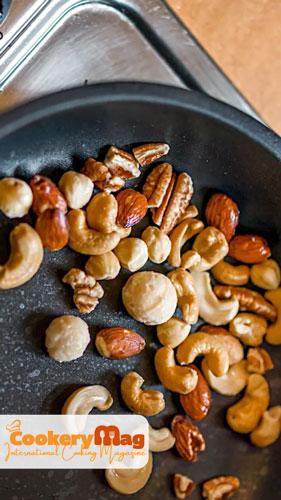
First, roast the desired nuts without oil until they are roasted and come off raw.
Mix water and sugar in a copper pot and put it on low heat until the sugar dissolves and the water gets hot.
But do not boil. (Be sure to put it on the flame spreader).
The second step:
After the sugar dissolves, add the glucose and mix well with a whisk or a wooden spoon until the nectar becomes elastic.
In the meantime, mix the egg white with an electric mixer until it becomes fluffy and doubles in volume. Then add rose water and stir a little.
Be careful not to boil the nectar while stirring.
The third step:
Test the nectar between two fingers until it reaches the stretch stage; that comes between two fingers.
When the nectar is ready, we pour some of it into the egg whites until they get to the same temperature, and after stirring a little, we pour all the egg whites into the nectar pot and stir the ingredients like Sculling.
The Fourth step:
This step is called heating, which must be done very carefully.
We mix the ingredients for 10 to 15 minutes with a whisk and at high speed, and we turn off the whisk a few times and stir the ingredients with a wooden spoon so that all the ingredients are covered and do not stick to the bottom.
The fifth step:
This stage takes one and a half to 2 hours to reach the so-called Persian nougat. Because the heat under the pot is low and you used a flame spreader, you can leave the pot occasionally and start stirring again to avoid getting tired.
The sixth step:
When the material reaches a stage where it hardens and does not fall off the spoon anymore, it is ready, and you can turn off the flame.
Add the roasted nuts to the Persian nougat and stir the mixture of Persian gaz and nuts.
Wait until the mixture cools down and becomes lukewarm. Then make it in any shape you want with the desired template.
The seventh step:
Just sprinkle a little flour inside the mold and shape the dough inside it. Please keep it in the refrigerator for a day and then use it.
Golden tips for having the best Persian Gaz
- If it is well heated and prepared, it can easily be kept outside the refrigerator and in a closed container; otherwise, you must keep it in the refrigerator.
- One of the ways to know that the Persian gaz is completely ready to serve is that when you take some of the material, the material easily separates from your hand and does not stick to your hand.
- To prepare Persian nougat, you must use liquid and colorless glucose. You can get glucose from confectioners’ supplies.
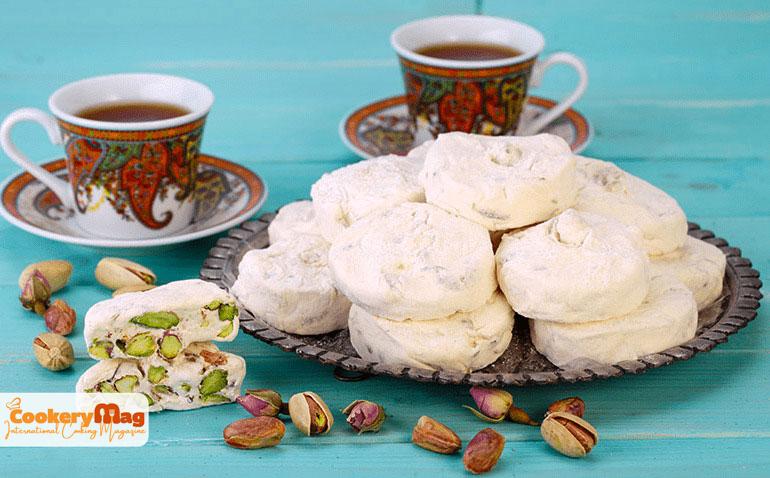
- You can increase or decrease the amount of nuts as you wish.
- The reason for the loosening of the Persian gaz can be that the consistency of the syrup is not good, and the ingredients are not heated well.
- The dryness of the Persian nougat is because the consistency of the syrup is too thick, and the ingredients are overheated.
Difference between flour gaz (گز آردی) and ordinary Gaz (Persian gaz)
The interesting thing is that contrary to what most people think, the difference between flour gaz (گز آردی) and ordinary Gaz (Persian gaz) is only in how they are packaged.
The production process and structure of flour gaz (گز آردی) are entirely similar to ordinary Gaz (Persian nougat). Only at the end and when shaping the dough, Gaz turns into various shapes such as squares, circles, etc.
Having a journey in the history of Persian nougat
Unfortunately, there is no documented and accurate information regarding the history of the production of Isfahan Gaz.
Gaz is one of the most common traditional sweets, an export that dates back several centuries. Of course, more reliable quotes indicate that; The origin and age of Gaz was from the Qajar period.
So, during the Agha Muhammad Khan Qajar period, Gaz was exported to other countries, and it was usually one of the sweets that were given as gifts to the kings of other countries.
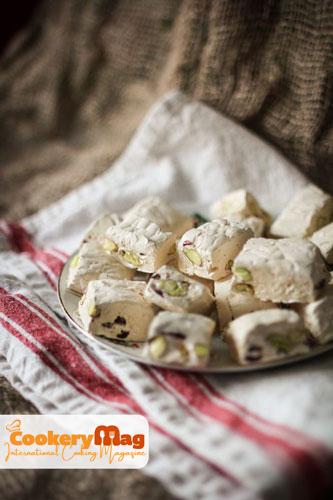
However, based on some oral and hand-to-hand memories, Gaz has a history as long as half of the life of Prophet Noah (PBUH); that is 450 years old and from the Safavid era and at the same time with the re-blooming of Iranian art and culture in Isfahan.
Humans have been using confectionery products for ceremonies, holidays, and celebrations for a long time.
By analyzing the food containers of people who lived nearly three thousand years ago, archaeologists concluded that people have been consuming chocolate since that time.
Paying attention to the spirit of hospitality, they have mastered the production of sweets and candies since ancient times.
Confectionery products are among those foods that have countless fans, and something other than a doctor’s order can’t likely prevent their consumption.

Gaz is the main souvenir of Isfahan; on this occasion, the 26th of Bahman (Iranian 11th month) is named as Isfahan Gaz Day in Iran’s tourism calendar.
Different types of Persian nougat
Applying every small change in preparing Persian Gaz has caused significant changes in its taste. It has created different Persian nougat sweets in different shapes and tastes.
Gaz Loghmei (گز لقمه ایی): It is the most important and oldest type of Gaz, prepared in small packages and bites.
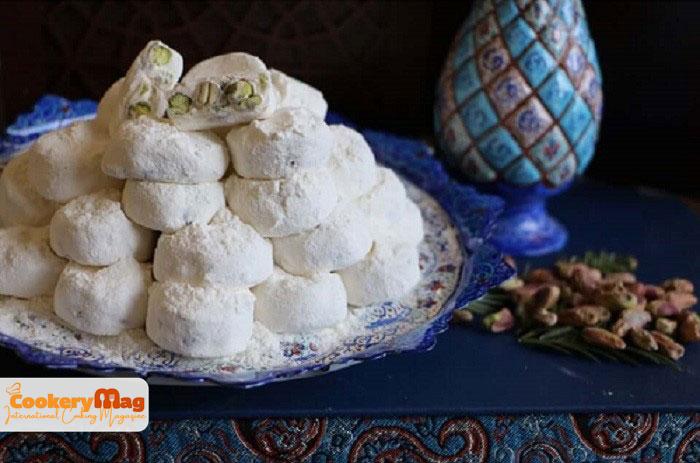
Gaz Ardi (گز آردی): Gaz Ardi can be considered the most popular type of this sweet.
Persian Gaz Ardi is known as the most authentic and high-quality type of gaze due to its presence of Manna.
Gaz boreshi (گز بُرشی): Cutting edges can be recognized by the cut brains on their sides. This type of mesh is cut with a machine and is usually square or rectangular in shape.
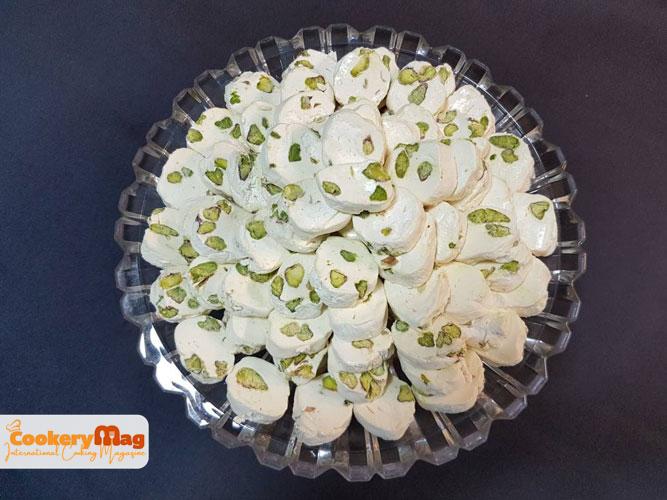
Coin-shaped gaz (گز سکه ایی): Coin-shaped mesh is classified separately due to its different appearance. This type of bite has a round and coin-like shape.
Gaz shekan dar (گز شکن دار): One of the methods used to increase the shelf life of Persian gaz is to reduce its humidity.
This Persian nougat is sweet with less than 6% moisture. Due to the very low humidity, this type of mesh breaks with the slightest impact.
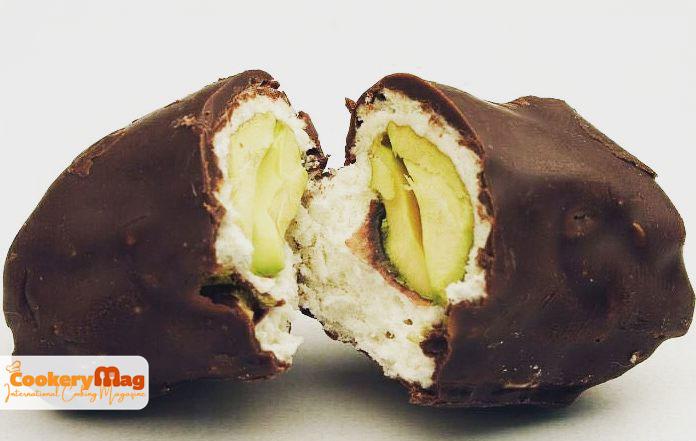
Chocolate Covered Gaz (گز روکش شکلات): Another creativity used in the preparation of Gaz is using a chocolate coating to preserve moisture and increase its shelf life. This type of mesh dries later.
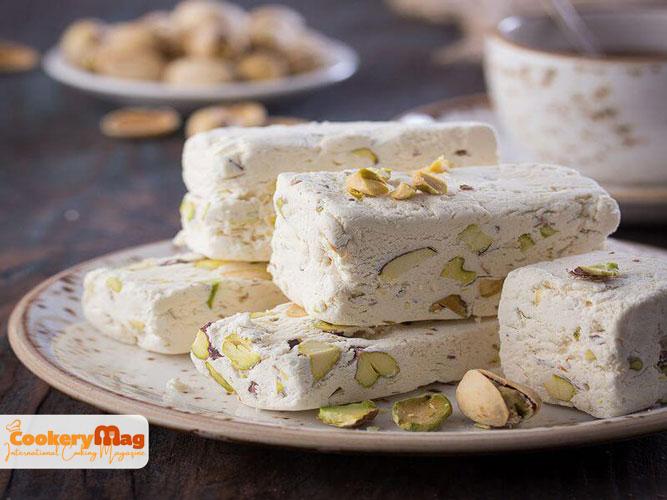
Soft Gaz (گز نرم): This type of Persian nougat has a firmer texture than other types due to its 8-12% moisture content. Usually, the shelf life of soft mats is longer than other mats.
Frequently Asked Questions about Persian gaz
How many calories are in Persian Gaz?
Each Persian Gaz can weigh from 25 to 50g. 3.5 oz (100g) of Persian Gaz (Pistachio Nougat) has 293 calories (67 calories from fat).
What is Persian Gaz or Persian nougat?
Persian Gaz is an Iranian nougat that originated in the Isfahan region. It is widely known as Persian Nougat in American and European countries. It is made from pistachio, almond kernels, rose water, and egg whites.
Conclusion
Thank you for being with us with this excellent, delicious, authentic Persian gaz. Share your experiences with us, and if you have any tips to improve the Persian nougat recipe, comment for us; thank you.
It is hoped that among the delicious foods of different societies, Iranian food is gaining more and more fans daily.
Please share this article with your friends on Facebook, Twitter, Pinterest, and other social media. 🧡

